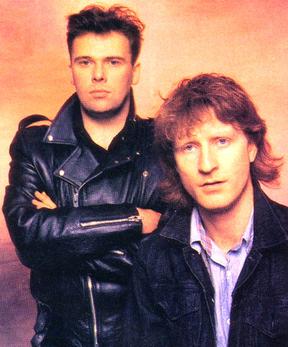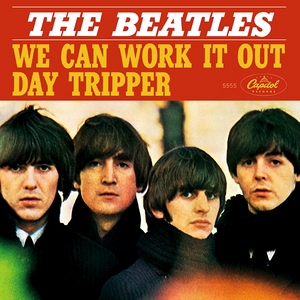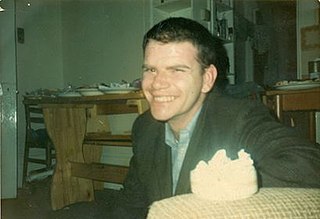
Microdisney were an Irish rock band formed in Cork in 1980. They were founded and led by songwriters Cathal Coughlan and Sean O'Hagan (guitar). Originally typeset as Micro Disney, the band had become Microdisney by the time they had relocated to London in 1983 and signed to Rough Trade Records. Between 1983 and 1986 the band recorded six Peel Sessions for BBC Radio and released their debut album for Rough Trade called Everybody Is Fantastic.

Cathal Coughlan was an Irish singer and songwriter from Cork, best known as the frontman of the band Microdisney, formed with Sean O'Hagan in 1980. Their second album The Clock Comes Down the Stairs reached number one in the UK Indie Chart. They developed cult followings in the Irish and UK indie music scenes before breaking up in 1988.

"Day Tripper" is a song by the English rock band the Beatles that was released as a double A-side single with "We Can Work It Out" in December 1965. The song was written primarily by John Lennon with some contributions from Paul McCartney and was credited to the Lennon–McCartney partnership. Both songs were recorded during the sessions for the band's Rubber Soul album. The single topped charts in Britain, Ireland, the Netherlands and Norway. In the United States, "Day Tripper" peaked at number five on the Billboard Hot 100 chart and "We Can Work It Out" held the top position.
China Drum are an English punk rock band from Ovingham in Northumberland, England, active initially from 1989 to 2000, playing under the name The Drum beginning in 1999. The group released three moderately successful full-length albums and toured in support of noted punk and alternative rock groups, including Green Day, Ash, and Supergrass. They reformed in 2013 under the China Drum moniker.

The Sultans of Ping are an Irish band formed in 1988 by Niall O'Flaherty, Pat O'Connell, Paul Fennelly and Ger Lyons. The band's name is a play on the 1978 Dire Straits song "Sultans of Swing", dating from a time when "it was sacrilege to say anything whatsoever funny or nasty about Dire Straits".

The Ireland international rules football team is the representative team for Ireland in international rules football, a compromise between Gaelic football and Australian rules football. The team is made up of Irish players from the Gaelic Athletic Association and Australian Football League.
Setanta Records was a British independent record label led by founder Keith Cullen. Setanta published UK and Irish indie music in the late 1980s and in the 1990s.

Sir Henry's was a bar and nightclub on South Main Street in Cork, Ireland. It was founded by Jerry Lucey in 1978. The name was derived from Henry O'Shea, a baker and building owner in the South Main Street area of Cork city. The club was known for its house, trance, R&B, hip hop and regular live rock concerts. Gigs held there included a number by The Golden Horde, Toasted Heretic, Sonic Youth with support band Nirvana, Therapy?, The Wedding Present and The Fall.

Reekus Records is an Irish independent record label and publishing company based in Dublin, founded by Elvera Butler in 1981. The label specializes in the promotion of mostly Irish rock and alternative music.
Liam Heffernan is an Irish actor, theater director and musician best known for his lead role in the critically acclaimed film The Clash of the Ash (1987), and later as the traveller Blackie Connors in the long running RTÉ television drama series Glenroe.

Five Go Down to the Sea? were an Irish post-punk band from Cork, active between 1978 and 1989. Vocalist and lyricist Finbarr Donnelly, guitarist Ricky Dineen and brothers Philip (bass) and Keith "Smelly" O'Connell (drums) formed the band as Nun Attax while teenagers. They became known for Donnelly's absurdist, surreal lyrics and stage presence, Dineen's angular guitar and their Captain Beefheart-style rhythm section. The group changed their name to Five Go Down to the Sea? after moving to London in 1983. Their line-up has at times included guitarists Mick Finnegan, Giordaí Ua Laoghaire, Mick Stack, and the cellist Úna Ní Chanainn.
The Donegal county hurling team represents Donegal in hurling and is governed by Donegal GAA, the county board of the Gaelic Athletic Association. The team competes in the Nicky Rackard Cup and the National Hurling League.

Knot a Fish is the debut and most critically acclaimed EP by the Irish post-punk band Five Go Down to the Sea?, released in 1983 on the London-Irish label Kabuki records and distributed by Rough Trade. Recorded just after the band changed their name from Nun Attax, it is the only of their recordings to feature cellist Úna Ní Chanainn, and is widely considered their best work.

Ricky Dineen is an Irish musician best known as the guitarist with the post-punk band Five Go Down to the Sea?, earlier known as Nun Attax, later as Beethoven–fucking–Beethoven. He wrote most of the band's music and developed their angular musical style, which he said was in part influenced by The Fire Engines, Gang of Four, The Mekons and Bogshed.

Finbarr Donnelly was a singer and songwriter from Northern Ireland, who moved to Cork city at a young age. He is best known as the vocalist with the post-punk band Five Go Down to the Sea?. Known for his striking stage presence and absurdist, surreal lyrics, he and the band were hugely influential on later generations of Irish musicians. Mark McAvoy, author of "Cork Rock: From Rory Gallagher to the Sultans of Ping", said in a 2017 interview that "Donnelly probably would have been the most influential musician and songwriter in...the Cork music scene and the bands that stemmed from it."

Hiding from the Landlord is a twenty-four track compilation album by the Irish post-punk band Five Go Down to the Sea?. It was released in April 2020 on vinyl and CD by Allchival records, an imprint of AllCity Records.
Giordaí Ua Laoghaire is an Irish songwriter and guitarist best known as a founding member of Nine Wassies From Bainne, who released the album Ciddy Hall in 1998. Born in Ovens, County Cork in the early 1960s, he has played with Five Go Down to the Sea? (1979–1980), Microdisney (mid-1980's) and Soon (late-1980's). The Wassies, formed in the early 1990s, were primarily an instrumental and live band, and recorded only a single album.

Kaught at the Kampus is a live compilation 12-inch EP conceived and organised by Irish promoter Elvera Butler, and released in 1981 on her Reekus Records label. A showcase of then emerging Cork city punk and post-punk bands, it contains tracks by Nun Attax, Mean Features, Urban Blitz and Microdisney
Paul McDermott is an Irish producer and broadcaster best known for his audio documentaries on the bands Five Go Down to the Sea?, Stump, Microdisney and the 1970s experimental musician Michael O'Shea. He has written for RTÉ Culture, The Irish Times and the Sunday Independent. Originally from Cork, he now lives in Dublin where he is head of Media & Arts at Rathmines College of Further Education and hosts "Songs to Learn and Sing" with Dublin City FM.

Singing in Braille is an EP by the Irish post-punk band Five Go Down to the Sea?, released in August 1985 on Creation Records. It was recorded in April 1985 and produced by Joe Foster.














